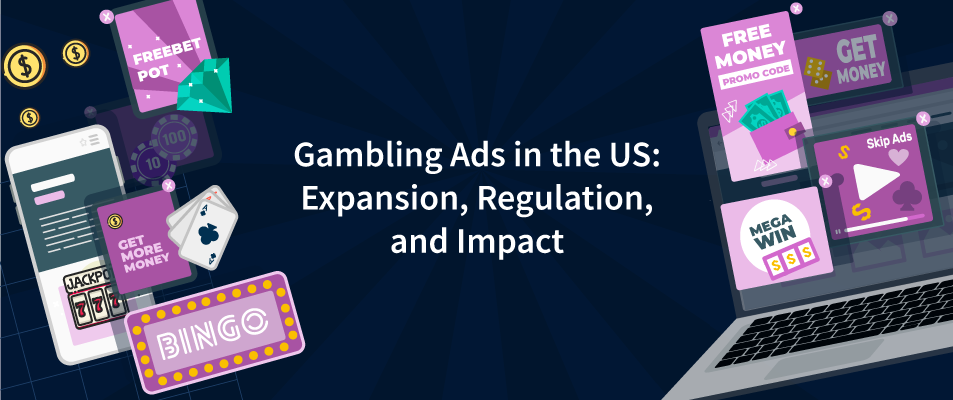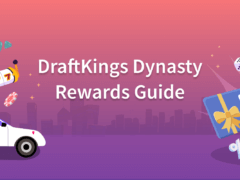Join our subscription list to get access to new bonus offers, online casino reviews, and industry news all in one newsletter!
Gambling Ads in the US: Expansion, Regulation, and Impact [2026 Guide]

 9.1K
9.1K
Notes on Gambling Advertising in the US
Gambling ads are created by casinos, bookmakers, lotteries, and other similar organizations that accept bets to promote this activity. Unlike alcohol and tobacco advertising which are highly regulated, gambling advertising is not always subjected to laws. This is especially true for gambling ads in the US, where the regulatory framework for this marketing form is still in development. Of course, the general regulations are applied to these ads, which means they can’t target minors or include false or misleading claims, with every state posing a separate set of rules applicable to gambling advertisements.
It’s important to continue the conversation about the gambling ads regulations since the marketing budgets and reach of the campaigns are quite staggering.
For instance, DraftKings have tripled their ad budget in the last few years. These campaigns allegedly contributed to the popularization of online sportsbooks and casinos. The US gross gambling revenue alone hit a record $53 billion in 2021, which is expected to increase by at least 15% by the end of 2022. According to a report published by Grand View Research, Inc, the global gaming market is expected to reach $504.29 billion by 2030.
On one hand, the ads help casinos and bookies promote the work and let players become aware of the special offers, new games, and exclusive deals. On the other hand, they are implied to contribute to the growing number of gambling addicts across the country. According to the stats provided by the National Council of Problem Gambling, over 2 million people in the United States have a gambling addiction. A recent study Relationships Between Exposure to Different Gambling Advertising Types, Advertising Impact and Problem Gambling conducted by Syvertsen, A., Erevik, E.K. and Hanss, D. claims that direct advertising exposure increases linearly with gambling risk severity.
Undoubtedly, easy access to casino ads has attracted some people with underlying problems to join casinos. Also, underage individuals are continuously exposed to this kind of advertising via social media. Even though some platforms have banned gambling ads, many are yet to tackle this issue, like Twitch, popular among minors, where this activity is advertised and supported (live slot streaming, etc.). All these things make us think of the lingering effect online gambling ads have on the consumers.
Gambling Ads Regulation in the US
Several countries, including the United Kingdom, Australia, and Spain, have introduced legal regulations regarding advertising in the gambling market. These countries exemplify what these regulations can look like and what the aftermath of their implementation may be. Let’s take a look at some of them.
For example, in the UK, where this activity has a long history, a well developed set of regulations focuses on this issue. Under the Gambling Act 2005, gambling operators working in the UK must obtain a Gambling Commission license to advertise to British players. Every operator must comply with the Advertising Codes managed by the Advertising Standards Authority. The basic idea is to prevent casinos, bookmakers, and related entities from irresponsibly encouraging gambling behavior or claiming that gambling can make them rich. The ads can’t feature persons under 25 or carry messages that make gambling attractive to minors.
We should also note that the UK has banned gambling ads featuring sports and reality TV stars; the changes introduced by the Committee of Advertising Practice (CAP) came into effect on 1 October 2022. The new rules apply to social media influencers, celebrities and sportspeople who may appeal to minors or young persons by being associated with or reflecting youth culture. Generally speaking, European countries follow one of the policies: liberal gambling ad regulation with some restrictions (the Netherlands, Scandinavia), partial ban on this form of marketing (the Czech Republic), or total ban (Moldova).
Australian laws are even stricter. The Totalisator Agency Board (TAB), the monopoly totalisator organization in Australia operating betting shops and online betting, has been restricted from all online and TV ads since the late 1990s. The Australian Communications and Media Authority (ACMA) has introduced a set of strict rules regarding gambling advertising, effectively prohibiting gambling advertising and promotion of odds during live sport streamed over the internet, as well as live sport on broadcast TV and radio. However, online advertisements, such as targeted banners and emails, remain in a regulatory limbo, still reaching voluntarily self-excluded individuals on a daily basis thus impairing the already existing problem gambling crisis in Australia.

Now let’s take a closer look at gambling ads regulations in the United States. Just as any piece of media, gambling advertising is protected by the U.S. Constitution, to be more precise, the First Amendment, which protects the ads by preserving the freedom of speech and press. Gambling is legal when engaged in by adults, which makes gambling advertising legal too. However, promoting unlawful activity and misleading information is illegal. In the future, federal departments and state authorities should invest more into identifying and presenting such information and activities in casino/betting ads correctly.
Before the online era, certain states and territories (North Carolina, Puerto Rico) attempted to regulate gambling and casino ads. In the case of Puerto Rico, the regulations were crystallized as a result of a partnership franchised to operate a casino challenging the constitutionality of Puerto Rico’s Games of Chance Act of 1948 that had strictly prohibited advertising any gambling activities. An intermediate appellate court in Puerto Rico narrowed the scope of the law to prohibit only those advertisements directed to bona fide residents of Puerto Rico in the local publicity media. Under that narrow construction, advertising was allowed if it was directed to tourists, provided that the advertisements did not invite residents of Puerto Rico to visit the casinos, even though the advertisements may incidentally reach the hands of a local resident. Another thing that made the state authorities back off was the unanimous Supreme Court decision in 1999, which struck down 18. U.S.C. 1304, a federal law banning broadcasting ads for gambling casinos. According to the Supreme Court, such a law violates the First Amendment.
Regarding social media and search engines, we have Google as the world’s leading platform that supports responsible gambling advertising. The company follows local gambling laws and respects the industry standards. In general, ads related to gambling are allowed, but only if they meet Google’s terms and conditions. Both online non-casino games and online gambling Google ads are allowed with limitations in the United States. Remember that advertisers must be certified with Google, as well as targeted to approved countries and in possession of a landing page displaying information about responsible gambling.
Facebook (Meta), the world’s most popular social media network, allows ads with or without permission depending on the type of gambling in question. For example, the promotion of real money, land-based casinos, and state/government lotteries are allowed without written permission. However, Facebook gambling ads about online gambling require such approval.
The conversation about gambling ads regulation and the industry in general would be impossible without mentioning the American Gaming Association. As a non-governmental US gaming industry association, the organization addresses federal regulatory and legislative issues, as well as serving as a source of accurate gaming industry data. The AGA represents the US casino industry and its Responsible Marketing Code for Sports Wagering. In a bid to promote responsible gambling and betting, the casinos and bookmakers created the code through AGA.
The code is focused on supporting responsible gaming, recognizing and respecting the legal age for sports wagering, controlling websites and digital media (messages placed in digital media compliance with all applicable provisions of the code, as well as geolocation mechanisms and user-generated content oversight), and monitoring code compliance via biannual training opportunities for members and employees of members involved in the advertising or marketing of sports wagering services, and regular updates of the code.
The prominent example of stringent gambling advertising regulations is Illinois. Its administrative code contains a chapter devoted to advertising and marketing of sports wagering operators. It states, among other rules, that all the marketing materials must include problem gambling language materially consistent with the compulsive gambling text determined by rule by the Department of Human Services; the materials shall not be placed in media outlets that appeal primarily to individuals under 21 and must state that all patrons must be 21 years of age or older to wager.
It’s important to note that the set of rules implemented by the Illinois Gaming Board (IGB) is applicable to all forms of advertising and marketing, including broadcast media, direct mail, billboards, and internet advertising, essentially becoming the first US code to fully regulate gambling advertising on the internet. This sets a precedent for other states with legal sports and casino wagering for how the regulations can be implemented on the governmental level. The question remains though, when will other states follow the pioneer and if they are going to at all?
Sports Betting Ads in Numbers
As the most popular form of online gambling in the US, sports wagering has amassed sufficient data relevant to our analysis. To understand the size of the sports betting marketing industry, we should take a closer look at the numbers.
Even though bookmakers and affiliated companies use all sorts of media to promote their products, the truth is that TV and online ads (Google Search ads, PPC ads, social media ads, banner ads, in-app ads, etc.) are the most common. This makes sense because the number of people who read newspapers or listen to the radio is dwindling.
According to a recent report from iSpot.tv, in just nine months (Sep. 2021-May 2022), US sports betting companies invested over $280 million in TV ads alone. Spending money on TV advertisements as a bookmaker still makes sense because many people prefer watching the games on TV despite the live streams of sporting events on mobile devices and computers. It’s also worth noting that the numbers mentioned above represent an increase in spending of almost 300% from September 2021 to May 2022. In the same period, the ads reached 48.4% more people.
The FanDuel Sportsbook is the top brand within the US in terms of TV ad impressions (“impression” meaning the number of times an advertisement is displayed). They got 34% of all ad impressions. They are followed by Caesars with 21.7%, DraftKings with 18.6%, BetMGM with 13.4%, and Fox Bet with 7.5%. Also, CBS had the biggest share in ad impressions, with Fox coming a close second. To put it into perspective, the top 5 brands in terms of ad impressions took up more than 95% of airtime allotted to gambling advertising.
Online ads are the second most popular place where sportsbooks from the US spend their marketing budgets. They spent more than $140 million between 2020 and 2021 (compared to $336 million spent on TV ads). That leaves around $12 million on other forms of advertising.
The Impact of Gambling Ads on the Consumers
Gambling advertisements are not a problem per se, even considering the sheer number of ads broadcast, but things go wrong when people with gambling problems are exposed to such marketing materials. Gambling advertising: A critical research review, a report prepared by Per Binde for the Responsible Gambling Trust, includes takeaways from 12 questionnaires focused on the self-rated impact of gambling advertising. The takeaways provide conclusive data on the direct correlation between increased gambling advertising exposure and the urge to participate in gambling activities in problem gamblers. Online ads are even more problematic in this regard because analytics companies and social media generally collect data based on your activity and show ads tailored to your specific online behavior.
Additionally, there’s always the impending danger of the overexposure of underage individuals to these ads even though they are not targeted directly. A recent study conducted by the University of Bristol revealed that almost 50% of minors and 75% of young people (18 to 24) encountered gambling related ads on Twitter in a week. On top of that, almost 25% of minors and 35% of young people were exposed to gambling ads on Twitter on a daily basis. This is implied to be the result of this age category representatives’ increased interest in eSports manifested in a form of subscriptions to the eSports teams public accounts and similar pages, however, it does not justify the exposure of underage individuals to gambling advertising.
Gambling addiction in adults is difficult, but it’s even worse in persons under 21. Indeed, some precautionary measures can be taken by parents to avoid minors’ exposure to gambling ads, namely blocking gambling companies’ accounts on social media and using Google’s Family Link to filter unwanted content, but the regulations implemented by the state’s authorities would ensure a more profound and lasting impact.
It’s All About Finding Balance
In the end, it’s all about finding balance. We live in an age where people are exposed to commercials multiple times a day – on their computers, mobile devices, TVs, on the streets (billboards), etc.
Unlike in the past, when businesses were allowed to promote misleading messages, the situation is different today. Even though the gambling advertising regulatory framework is yet to be finalized in the US, operators still have to follow the laws and regulations applied to ads in general. According to the authorities, this is enough for the time being. Some argue that this expansion in gambling ads in the US results from the legalization of online gambling in several states and that we will see fewer ads in the near future once the average adult becomes aware of that. This makes sense because the advertisement is most aggressive when a new product hits the market. Of course, we will all have to wait and see what will happen in the future. Meanwhile, people dealing with problem gambling should be cautious and reminded of the potential threat that these ads pose.
References
- American Gaming Association – Responsible Marketing Code for Sports Wagering, americangaming.org, 14 September 2020.
- Walters Law Group – Advertising Casinos, firstamendment.com.
- Google Advertising Policies Help – Gambling and games, support.google.com.
- Facebook Advertising Policies – Online Gambling and Gaming, facebook.com.
- CBS News – Study finds only 1 in 5 people with gambling problem seek help, cbsnews.com, 14 July 2022.
- UK Legislation – Gambling Act 2005, legislation.gov.uk.
- NPR – Sports betting ads are everywhere. Some worry gamblers will pay a steep price, npr.org, 18 June 2022.
- University of Bristol – What are the odds? The appeal of gambling adverts to children and young persons on Twitter, bristol.ac.uk, October 2021.
- iSpot.tv – Betting on TV Advertising: Sportsbook Brands Expand Reach and Resonance, ispot.tv, 8 June 2022.
- SpringerLink – Syvertsen, A., Erevik, E.K., Hanss, D. et al. Relationships Between Exposure to Different Gambling Advertising Types, Advertising Impact and Problem Gambling, J Gambl Stud 38, 465–482, link.springer.com, 31 May 2021.
- BeGambleAware – Gambling advertising: A critical research review, Per Binde, begambleaware.org, 2014.










